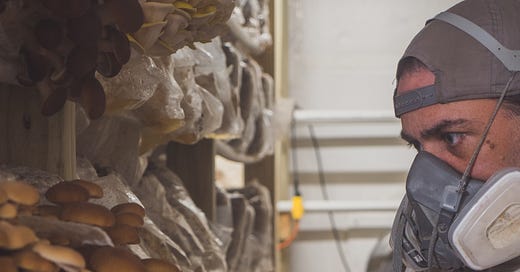What We Talk About When We Talk About Local: When Trust Scales, So Can We
Local food doesn’t survive on sentiment. It survives on systems. And one of the most overlooked systems in local food is trust.
Not the kind you earn once with a good product. The kind you earn repeatedly with follow-through, consistency, and shared risk. The kind that allows a Chef to text you in a panic on a Saturday and trust that you’ll show up an hour later with the mushrooms they need for tonight’s special.
That actually happened to me.
We were just starting to build our mushroom farm’s restaurant accounts. One chef had taken a chance on us with a new dish, and it was apparently too popular. They nearly sold out on a Friday night. By Saturday afternoon, I had a message from him asking if there was any way we could deliver more that day. We didn’t usually do weekend deliveries, but I said yes. I went to the farm, harvested fresh, loaded up the car, made the drive, and handed him a fresh order an hour later. That favor turned into trust. That trust turned into a steady account, and that introduced us to others.
People talk about scaling farms. But they rarely talk about what it takes to scale trust.
This is why I believe the farms that thrive long-term aren’t always the ones with the best margins or most pristine produce. They’re the ones who can deliver consistently. Who communicate clearly. Those who build systems that say: you can count on us.
At a certain point, the food is table stakes. What matters is how you show up.
And here’s where it gets interesting: trust is scalable. But only if we design for it.
When I say design, I’m not talking about logos or websites. I’m talking about feedback loops. Communication templates. Agreements. Clear ordering systems. Honest pricing.
Too often, local food depends on hustle. On charm. On last-minute texts and back-of-truck transactions. That might work for a season. It might even work for a few years. But it doesn't build a system that can last.
Real trust lives in the boring stuff: follow-up emails, updated availability lists, and reliable drop windows. It’s the chef who knows you’ll text if there’s a delay. The school buyer who knows you’ll give them a straight answer about volume. The father who knows their CSA box will show up on time.
This is also where we start to connect back to the "Infrastructure" pillar in the local food roadmap. Because trust and infrastructure are deeply linked. It’s hard to deliver reliably if you don’t have cold storage. Or if your van is held together with duct tape. Or if your ordering process changes every week.
Scaling trust means investing in infrastructure—not just physical, but relational. Digital systems that let customers order easily. Templates that standardize communication. Delivery routes that aren’t reliant on heroics.
Farmers need support to do this. It shouldn’t be a solo act. But it also shouldn’t be postponed until everything is perfect. Every time you show up reliably, you’re building something.
And the payoff? That’s when trust starts working for you.
Chefs refer you. Buyers advocate for you. Customers promote you. Not because you asked, but because you proved yourself trustworthy again and again.
And just like that, your small farm stops feeling small.
So if you’re a farmer wondering how to grow without burning out, start here:
Where in your business could you make trust easier to earn?
What system could you improve this week to reduce friction or build consistency?
Who already trusts you—and how can you make their experience even smoother?
We don’t have to scale like Big Ag. But we can scale our connection. And when we do that with intention, we create something worth keeping.
Let’s make local food dependable. Let’s make it durable. Let’s build it on trust—and let that trust grow.





